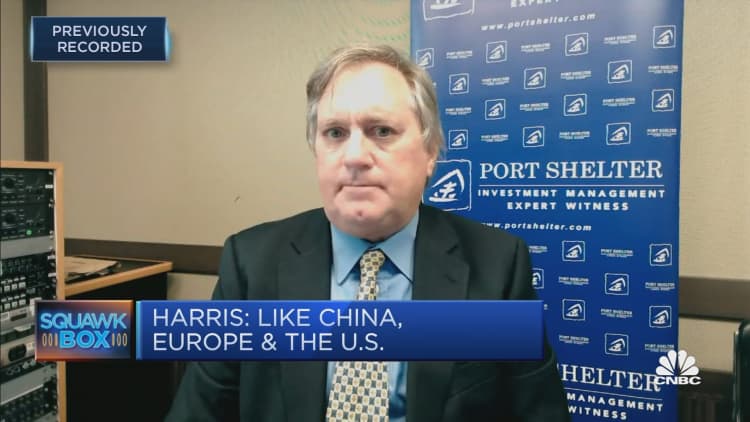
SINGAPORE — As 2020 draws to a close, it appears to have been a mixed year for markets in Asia-Pacific as the world continues to look toward a recovery from the coronavirus pandemic.
China's Shenzhen component is a standout among the region's major markets, having risen 38.73% in 2020. The country's CSI 300 index, which tracks the biggest firms listed on the mainland, was also among the region's top performers as it rose 27.21% for the year.
Those figures echo China's tremendous economic recovery after the country earlier this year instituted lockdowns to stem the virus' spread.
Elsewhere, South Korea's Kospi also saw robust gains, soaring more than 30% for the year.
Here's a look at the 2020 performance for major indexes in Asia-Pacific, based on CNBC calculations:
- Australia's S&P/ASX 200: -1.45%
- China's CSI 300: +27.21%
- China's Shanghai composite: +13.87%
- China's Shenzhen component: +38.73%
- Hong Kong's Hang Seng index: -3.4%
- India's BSE Sensex: +15.75%
- India's Nifty 50: +14.9%
- Indonesia's Jakarta Composite: -5.09%
- Japan's Nikkei 225: +16.01%
- Malaysia's FTSE Bursa Malaysia KLCI Index: +2.42%
- Philippines' PSE Composite Index: -8.64%
- South Korea's Kospi: +30.75%
- Singapore's Straits Times index: -11.76%
- Taiwan's Taiex: +22.8%
- Thailand's SET Composite index: -8.26%
- Vietnam's VN-Index: +14.87%
In comparison, the Nasdaq Composite stateside has surged 43.44% for the year as of its Dec. 30 close. The index smashed multiple records this year as investors flocked toward its constituent tech stocks. The sector benefited from changes in consumer behavior spurred by the pandemic like increased remote work. The S&P 500 has also risen 15.52% in the same period.
Over in Europe, the pan-European Stoxx 600 has declined 3.75% for 2020, as of its Dec. 30 close.
Northeast Asia: Potential investor safe haven
Going into 2021, global investors may favor stocks in China, Japan, Taiwan and South Korea, according to Jim McCafferty, joint head of Asia-Pacific equity research at Nomura.
"Our view is that the Covid management practices of governments around the region in Asia have been far superior to what we've seen in the West and I think the market's kind of moving on," McCafferty told CNBC's "Squawk Box Asia" in late November.
"The weight of money in this region tends to be in Northeast Asia," he said. "I think going into 2021 a lot of global investors that need to be in equities will really look at Northeast Asia as a safe haven."
Still, countries such as Japan and South Korea saw a spike in virus infections in recent weeks — though at a relatively smaller scale as compared with their Western counterparts.
Vaccine distribution risk
Meanwhile, Javelin Wealth Management CEO Stephen Davies told CNBC's "Street Signs Asia" in mid-December that the time taken for the coronavirus vaccine to be rolled out is a risk factor.
"I am not necessarily sure that it's unique to Asia but obviously the risk to the downside is that the rollout of vaccine takes much longer than expected," Davies said.
That could result in the recovery trade taking "longer to come through" and markets running into a "period of fatigue" as investors see that the economic fallout is not actually going away soon, he said.
To date, two vaccines — one from Pfizer-BioNTech and the other from Moderna — have been approved for emergency use by the U.S. FDA. White House coronavirus advisor Dr. Anthony Fauci, however, recently told CNN that the vaccine rollout has been slower than anticipated.
In Asia, Singapore was the first country regionally to receive the Pfizer-BioNTech vaccine, according to local media reports in December.
The risk to the downside is that the rollout of vaccine takes much longer than expected.Stephen DaviesCEO, Javelin Wealth Management
Still, Davies noted that during the early days of the pandemic, experts predicted it would take years to develop an effective vaccine for coronavirus. That timeframe has been drastically shortened. "So far those expectations have proved to be unnecessarily pessimistic," Davies said.
"We're still looking on the positive side and still working on the basis of that, that by the latter part of 2021 economic recovery on a broad basis will become much more apparent," the CEO said.
Port Shelter Investment Management's Richard Harris told CNBC's "Squawk Box Asia" on Wednesday that the markets "look quite good for 2021." Valuations may still be high, but Harris suggested that the market is likely to be driven by the presence of "enormous liquidity," as major central banks globally have seen "huge increases" in their balance sheet.
"We're looking at something like five times the size of the balance sheets of the four big central banks, you know: Europe, U.S., Japan, U.K.," he said. "That's an enormous amount of money that has to slosh around the system and it'll find a home in assets."
Furthermore, he added, good news surrounding the coronavirus is expected to come out periodically next year and "drown the concerns that people have."


